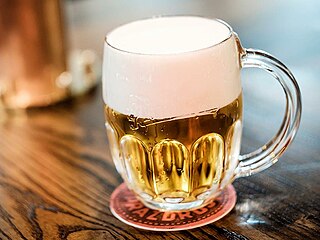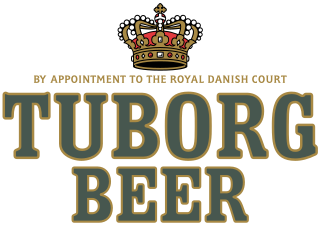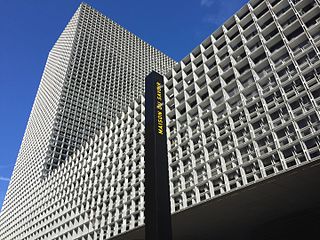
Pilsner is a type of pale lager. It takes its name from the Bohemian city of Plzeň, where the world's first pale lager was produced in 1842 by Pilsner Urquell Brewery.

Holsten Brewery is a brewing company founded in 1879 in what is now Hamburg's Altona-Nord quarter. The group now has seven breweries in Germany. Its nationally distributed premium brand is the pale lager Holsten Pilsener. The company was acquired by the Carlsberg Group in 2004.

Brasserie Nationale is the largest brewery in Luxembourg, based in Bascharage. They also export to Belgium, France, China, and since 2014 in the United States. They brew beer under the brand name Bofferding and since taking over in 2004 Battin.

Tuborg is a Danish brewing company founded in 1873 on a harbour in Hellerup, to the north of Copenhagen, Denmark. Since 1970 it has been part of the Carlsberg Group. The brewery's flagship, the Tuborg pilsner, was brewed for the first time in 1880.

Tyskie is a Polish brand of beer. Its name comes from the brewery located in the Upper Silesian town of Tychy. It is brewed by the Tychy Princely Brewery, part of the Kompania Piwowarska brewery group, which was acquired by Asahi Group Holdings in 2017.

Bascharage is a town and a former commune in south-western Luxembourg. Since 2012, it is part of the commune of Käerjeng.

Pétange is a commune and town in south-western Luxembourg. It is part of the canton of Esch-sur-Alzette. Pétange lies on the borders with both Belgium and France.

The culture of Luxembourg refers to the cultural life and traditions of Luxembourg. Most citizens are trilingual, speaking French and German in addition to the Germanic national language of Luxembourgish. Although its contributions to the arts are not largely known outside its borders, Luxembourg has a rich cultural history, especially in music, painting and photography. Its evolving museums, concert halls, theatres and galleries testify to its citizens' growing appreciation of culture.

Karlsberg is one of the largest breweries in Germany; the Karlsberg Group also owns various other beer brands. It is called Karlsbräu outside of Germany to differentiate it from the Danish brewing company Carlsberg.

Ganter is a private brewery based in Freiburg, Germany. It was founded in 1865 by Louis Ganter, and as of 2016 is run by Katharina Ganter-Fraschetti and Detlef Frankenberger.
Luxembourg's cuisine reflects the country's position between the Latin and Germanic countries, influenced by the cuisines of neighbouring France, Belgium and Germany. Recently, it has been influenced by the country's many Italian and Portuguese immigrants. As in Germany, most traditional, everyday Luxembourg dishes are of peasant origin, in contrast to the more sophisticated French fare.

Sternburg is a brand of German beer, brewed and bottled by Radeberger Group. Their best selling product is "Sternburg Export". In 2006 it had 9.5% of the market share in Eastern Germany.

Belval is a quarter and neighbourhood in the west of Esch-sur-Alzette, in south-western Luxembourg. Belval is the site of the large steelworks that dominate the city. Due to the dominance of the steelworks, Belval suffered from the abandonment of steel production in Luxembourg, and is undergoing an extensive regeneration programme to help diversify beyond steel production. The redevelopment plan, costed at €450m, will turn the brownfield site into a large scientific and cultural centre, including the science faculty of the University of Luxembourg. It is the location of the Rockhal, Luxembourg's largest music venue, which opened in 2005.

The history of rail transport in Luxembourg began in 1846 and continues to the present day.

Luxembourg has a long tradition of beer brewing, dating back to at least 1300. Although there used to be more than 12 local breweries in Luxembourg in the early 1950s, this number has come down to only three big breweries remaining in the early 2010s. The three big breweries still active today are: Brasserie Nationale, producing Bofferding and Battin, Brasserie de Luxembourg, producing Diekirch and Mousel, and Brasserie Simon, producing Simon and Ourdaller.

Brasserie Béierhaascht, is a Luxembourgish microbrewery/brewpub founded in Bascharage in 2002.

Brasserie de Dudelange was a Luxembourgish brewery which was founded by Jean-Pierre Steyer in 1937 and brewed in the city of Dudelange. In 1964 it was taken over by Brasserie Funck-Bricher. Brewing in Dudelange as well as producing beer under the Brasserie de Dudelange brand name stopped.

Grand Brewing Luxembourg, is a Luxembourgish brewery founded by Mark Hatherly in 2014.

Clausel, is a Luxembourgish beer brand founded by microbrewery Letzebuerger Stad Brauerei in 2007.
Ur-Krostitzer is a brand of beer from Krostitz near Leipzig, Germany.

















